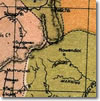
Corporate entry
| Home | Browse | Search | Previous | Next |

|
Unlocking Regional Memory
Corporate entry
|
|
Armidale Telegraph [Newspaper] (1865 - 1872) |
|
|
|
| Location: Armidale, New South Wales, Australia | |
First published by Frank Newton on 4 March 1865 the Armidale Telegraph and New England Advocate, was a weekly newspaper published on Saturday and cost sixpence. It boasted a circulation covering Walcha, Bundarra, Inverell, Glen Innes, Tenterfield, Grafton, Warialda and throughout New England. Early in its existence the name was changed to the Armidale Telegraph and Tenterfield Advocate. By late 1872 Newton decided to close the Telegraph and move to Inverell. |
Details |
|
The Armidale Telegraph was established in January 1865 by Frank Newton. Little is known about Newton, whose name first appears in mid-1864 as the founder-proprietor of the Grafton Herald. After the collapse of this short-lived newspaper, Newton placed a notice in the Armidale Express announcing the proposed commencement of a new paper, the Armidale Telegraph and New England Advocate, on 25 January 1865. There was some delay owing to problems of accommodation and transportation, but on 4 March the first issue of the Telegraph appeared. Like most journalists in the mid-nineteenth century, Newton claimed strict impartiality in newspaper reporting while at the same time promoting a particular set of interests and opinions. Thus Newton took as the Telegraph’s motto Invenium Viam, aut Faciam (‘I will either find a way for myself, or make one’) even as he sought to establish a mouthpiece for what he believed was ‘a large section of public opinion either wholly ignored or sedulously misrepresented’; namely, the local squatters. Newton’s remarks were mainly directed at the town’s existing newspaper, the Armidale Express, which, under the direction of Walter Craigie and William Hipgrave, had championed the ‘liberal’ cause of free selection and frustrated the political aspirations of numerous pastoralists. The Telegraph, with financial backing from local squatters, was meant to correct this ‘mendacious and one-sided’ affair. In the event, however, the great struggle over land ownership which had inspired the newspaper’s birth was resolved shortly after its appearance. As expected, the government increased rentals on Crown land at the end of 1865. But, to the squatters’ delight, the new rates were not as high as they had anticipated, while the liberals were sufficiently pleased with the outcome to moderate their more radical views on the subject. Henceforth, the Telegraph and the Armidale Express enjoyed a friendly rivalry; so much so, that at Newton’s testimonial in 1872 members of the Express were not only invited but Walter Craigie also chaired one of its meetings. In this more relaxed climate, the pastoralists increasingly took the view that there was no real need to patronise a rival newspaper; a feeling which had been reinforced by the election of the local squatter, Theophilus Cooper, to the seat of New England six weeks before the Telegraph made its debut. The situation was made much worse by the actions of Newton himself, who, in accordance with the principle of independence, frequently criticised the local squatters who had helped establish the newspaper in the first place. Not surprisingly, they now abandoned him en masse. As the Telegraph’s support base disappeared, Newton’s financial difficulties intensified. In May 1868, after he defaulted on mortgage payments, the Armidale Building Society took over the title of the Telegraph’s premises on Faulkner Street. The Building Society leased the property back to him at £40 a year, but by 1871 Newton was having difficulty even keeping up with this payment. The premises was sold in May that year. When, in 1872, Frank and Henry Vincent - former employees of the Telegraph - established a third newspaper, the Armidale Chronice, Newton decided to cut his losses and move to Inverell. There he founded another newspaper, the Inverell Dispatch and Central New Englander Advertiser, which, like the Armidale Telegraph, was established with the support of local pastoralists. But Newton had learned a valuable lesson from his experiences in Armidale. The Inverell Dispatch, though particularly vicious in its attacks on Inverell’s rival newspaper, the Courier, promoted the interests of local squatters and never strayed from the views of its political masters. Newton continued to run the Inverell Dispatch until his death at the age of 63 on 31 March 1878. Related Bodies: Related People: References: |
|
|
| ||
|
Published by The Australian Science and Technology Heritage Centre, 5 April 2004 Prepared by: Acknowledgements Updated: 23 February 2010 http://www.nswera.net.au/biogs/UNE0025b.htm |